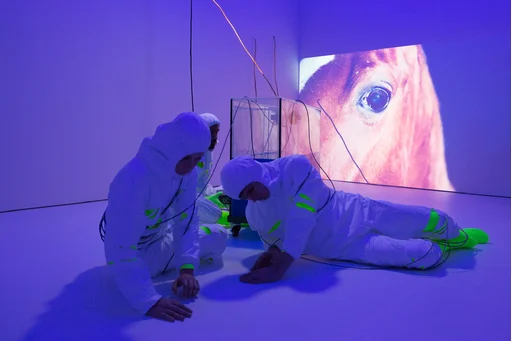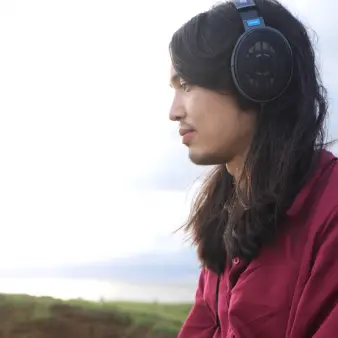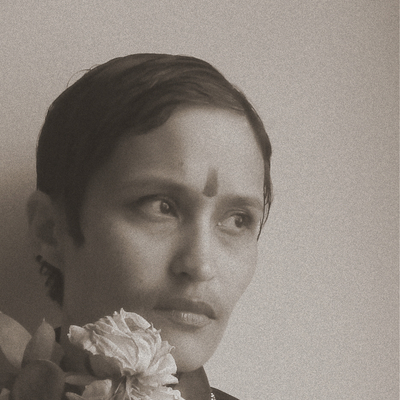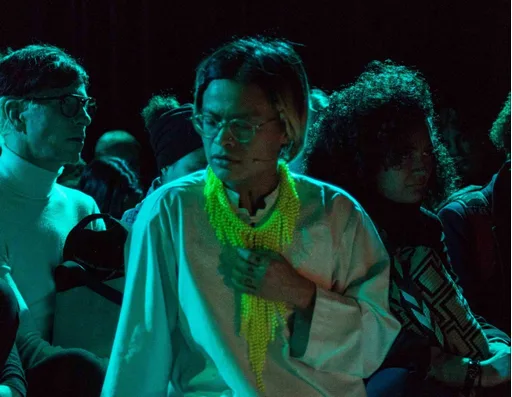This second episode of the Climate Imaginaries podcast was recorded over zoom in October 2023. The three artists you hear speaking in the episode, Phoebe Osborne, Raoni Muzho, and Rajni Shah, had a long slow dialogue leading up to this conversation, creating a shared map (linked below) which could be with them as they spoke. Grief and loss were present in different forms throughout the process of meeting, postponing, and then recording this conversation, and there is a strong current of grief in relation to Palestine that flows through the episode.
This episode comes in two parts. We invite you to begin listening by engaging with a continuous sighing practice offered by Raoni Muzho Saleh, before listening to the full episode. However, we have included them as separate recordings so that you can choose when and how you listen. The conversation itself lasts about an hour, and embraces non-linearity. We invite you to let go of expectations, and allow yourself to slow into the listening.
Acknowledgments and credits
The sounds of fire in this episode were recorded at Mile Island on Morrison Lake, located near Bracebridge, Ontario, on the traditional lands of the Huron-Wendat of Wendake, the Anishinaabeg, and specifically the Ojibway/Chippewa peoples. This territory is covered by the Robinson-Huron Treaty No. 61.
Light waves heard in this episode are the sounds of the waters of Gichi-aazhoogami-gichigami (Lake Huron), recorded at Singing Sands on the west of the Saugeen Peninsula (Bruce Peninsula National Park, Ontario). These are the traditional lands and waters of the Anishinaabeg, and specifically the Chippewas of Nawash Unceded First Nation, and the Chippewas of Saugeen First Nation. This territory is covered by the Upper Canada Treaty No. 72.
The recording of the ocean at the end of the episode was made at Reserva Eco-Arqueologica Punta Cometa (Punta Cometa Eco-archaological Reserve) of Mazunte, Oaxaca (Mexico), September 29 2022, 5pm. Also known as ‘el Cerro Sagrado’ (’sacred hill’), this landscape is situated on Zapotec lands and cared for by local community who have advanced initiatives to preserve it, registering it officially as an archaeological site in 2017.
All recordings were made by Fili 周 Gibbons with care and respect for the lands, waters, winds, trees, and creatures being recorded.
Shared map created by Phoebe, Rajni, and Raoni.
www.climateimaginariesatsea.org
The book Trans Care mentioned by Phoebe at the end of the episode can be found here:
www.upress.umn.edu
Light waves heard in this episode are the sounds of the waters of Gichi-aazhoogami-gichigami (Lake Huron), recorded at Singing Sands on the west of the Saugeen Peninsula (Bruce Peninsula National Park, Ontario). These are the traditional lands and waters of the Anishinaabeg, and specifically the Chippewas of Nawash Unceded First Nation, and the Chippewas of Saugeen First Nation. This territory is covered by the Upper Canada Treaty No. 72.
The recording of the ocean at the end of the episode was made at Reserva Eco-Arqueologica Punta Cometa (Punta Cometa Eco-archaological Reserve) of Mazunte, Oaxaca (Mexico), September 29 2022, 5pm. Also known as ‘el Cerro Sagrado’ (’sacred hill’), this landscape is situated on Zapotec lands and cared for by local community who have advanced initiatives to preserve it, registering it officially as an archaeological site in 2017.
All recordings were made by Fili 周 Gibbons with care and respect for the lands, waters, winds, trees, and creatures being recorded.
Shared map created by Phoebe, Rajni, and Raoni.
www.climateimaginariesatsea.org
The book Trans Care mentioned by Phoebe at the end of the episode can be found here:
www.upress.umn.edu
This podcast is part of the project Climate Imaginaries led by Laura Cull Ó Maoilearca, Sabine Niederer, and Patricia de Vries. With thank to Andy Dockett for web and technical assistance. Climate Imaginaries is part of the Art Route NWA-project ‘Bit by bit, or not at all’ financed by the Dutch Research Council (NWO) and an Imagination Laboratory within the SPRONG project Imagination in Transitions. It is also made possible with the support of Centre of Expertise for Creative Innovation (CoECI) in Amsterdam. Editing, mixing, sound design, and cello by Fili 周 Gibbons and Studio Apothicaire Contributors: Raoni Muzho Saleh, Phoebe/Phoebus Osborne Conversations hosted by Rajni Shah, and edited by Rajni Shah and Fili 周 Gibbons.
research group
Art & Spatial Praxis
Art & Spatial Praxis
project
Climate Imaginaries at Sea
Climate Imaginaries at Sea



